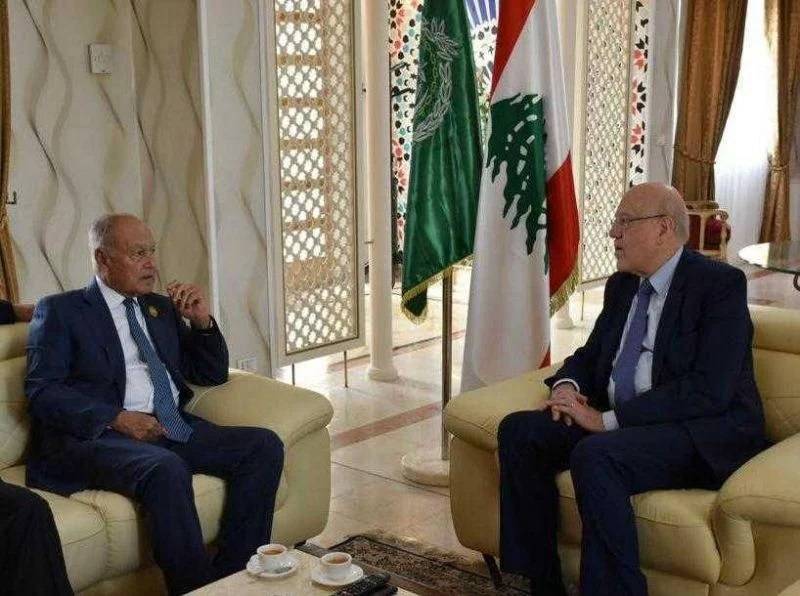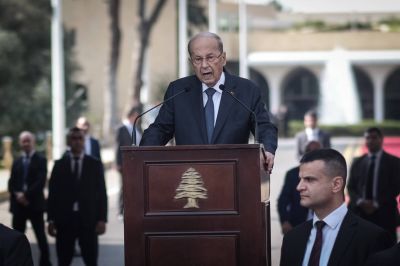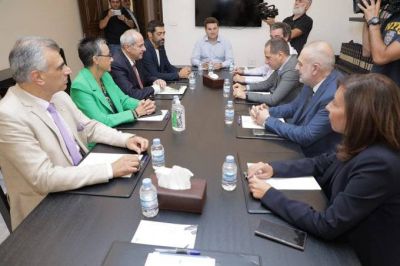
Caretaker Lebanese Prime Minister Najib Mikati (r) talks to Arab League Secretary General Ahmad Aboul Gheit in Algeria on November 1, 2022. (Credit: Twitter photo/@grandserail)
BEIRUT — Arab League Secretary-General Ahmad Aboul Gheit warned Tuesday that a prolonged presidential vacancy in Lebanon "will have negative consequences" for the country.
Lebanon entered an executive double vacancy Monday when President Michel Aoun's term ended. There is no elected candidate to succeed Aoun and the government is still functioning in caretaker status.
The first day of the presidential vacancy coincides with the Arab League summit held in Algeria, a first in three years due to the COVID-19 pandemic. Caretaker Prime Minister Najib Mikati attended the summit with a delegation including, among others, caretaker Foreign Affairs Minister Abdallah Bou Habib and Energy Minister Walid Fayad.
'A vacuum that the country can not bear;
"The presidential vacancy, over an extended period, will have negative consequences on Lebanon, with the current challenges it faces," said Aboul Gheit, according to a statement from his spokesperson. The Secretary-General assured the "full support of the Arab League to the Lebanese state in order to overcome this delicate period" and insisted on "the need for the current government to adopt the requested reforms, and for Lebanese politicians to assume their responsibilities."
Aboul Gheit also recalled "the need to place the national interest above all other considerations," in order to reach agreements to end the political stalemate.
For his part, Mikati thanked the Arab League for its "supportive role" in Lebanon, and called on the League "to continue this role in an active and effective way by pushing for the support of Arab countries in Lebanon."
President and Parliament
In a Tuesday interview with Sky News Arabia, Mikati said, "Our goal is the election of a new president as soon as possible, a president who unites the Lebanese and does not divide them." The caretaker Prime Minister added that "Parliament is meant to remain in session when the government resigns and is responsible for handling current affairs."
Parliament has held four sessions to elect a new president but failed all four times due to a lack of political consensus. Parliament Speaker Nabih Berri has not yet set a date for the next electoral session.
Two days before the end of his term, Aoun announced that he had signed a decree on the government's "resignation" and sent a letter to Parliament to inform MPs. In response to this letter, Berri scheduled a parliamentary session on Thursday.
According to analysts, Aoun's latest has no legal basis. Mikati has also defended this view.
Appeals from the EU, France and Iran
Earlier on Tuesday, European diplomatic chief Josep Borrell urged Lebanese leaders to form a government and elect a president "with the utmost urgency." On the last day of Aoun's term, Oct. 31, the French Ministry of Foreign Affairs called for "the proper and full functioning of all [Lebanese] institutions to take the necessary measures to redress the country and urgently improve the situation of the Lebanese."
Iran also expressed hope on Monday that Lebanon and "all political movements in the country, based on national interests," could form a "strong and national" cabinet, according to remarks made by Iranian Foreign Ministry spokesman Nasser Kanani and reported by the official agency IRNA.
The summit of Arab leaders is set against a backdrop of divisions over conflicts in the region, including in Syria and Libya as well as the normalization of some states with Israel. The Arab League — which includes 22 countries — last met in Tunis in March of 2019, before the pandemic.
Several countries, including some in the Gulf, are not represented by their heads of state, according to AFP. The Saudi Crown Prince Mohammad bin Salman, de facto leader of the kingdom, did not go to Algeria, due to health reasons. The leaders of Morocco, the United Arab Emirates and Bahrain were also absent.

